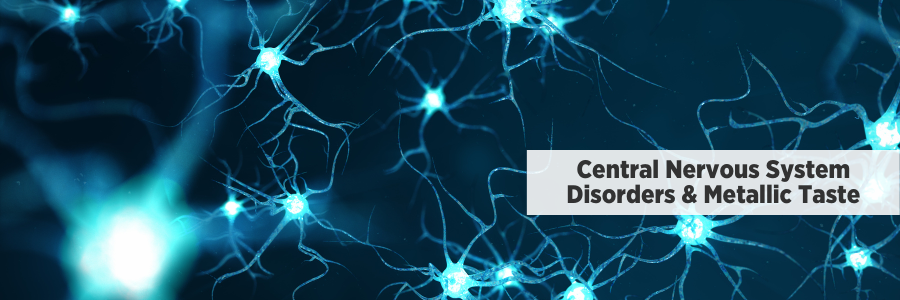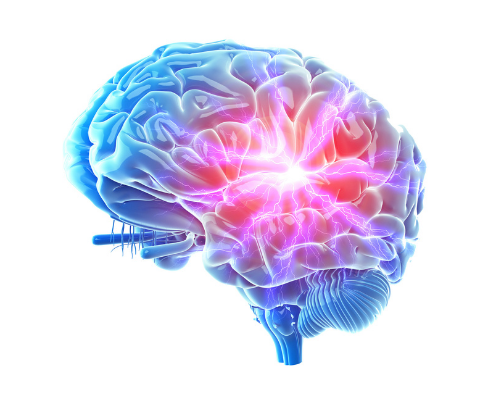


I have been a registered dental hygienist for over a decade. I have had the pleasure of working with amazing patients and educating them on their oral health throughout my career. Recently, I made the conscious decision to branch out within the dental field, choosing to maintain my dental hygiene license, and become a dental educator.
With a passion for oral and systemic health, I have seen clinically the direct impact systemic health can have on oral health. I will be extending my knowledge outside of the dental chair into the world and making an impact on the lives of others. Learn more about Sara, here.
Complaints of taste impairment are a major side effect associated with neurological disorders. This is because both taste and saliva production are regulated by the interaction between the brain and cranial nerves. If there is a disease or dysfunction of the brain specific to the central nervous system, this may also impair taste and saliva production in the mouth. These taste impairments may increase over time as the neurological disease progresses.
The central nervous system consists of the spinal cord and the brain. The central nervous system is responsible for the body’s physiological processes (such as movement) and behaviors through neurological processing and communication with all parts of the body.
Located within the central nervous system, there are several more systems. One of these systems is the gustatory complex.
The gustatory cortex is responsible for the stimulation of salivary production by the acinar cells, classified as mucous or serous cells. These cells are a vital component in maintaining saliva production via the salivary glands located in the mouth.
Another main function of the gustatory complex is to stimulate taste bud receptors called Tastants. These tastant receptors are located on the surface of the tongue and are stimulated when mixed with saliva in the mouth to create taste sensations.
Neuronal pathways from the taste bud receptors migrate via the cranial nerves to the brain, where tastant detection from the oral cavity is processed by the central nervous system.
Taste is mediated by three cranial nerves:
The taste qualities of bitter, salty, sour, sweet, or umami are then sensed and detected. And that is how taste sensation is developed. This is the pathway of taste from your mouth to your brain recognizing what you are tasting, if you’d like to learn more about the pathway of taste, click here.
These central nervous system disorders may impact dysfunction of the gustatory complex:

Whenever there is a change of homeostasis in the central nervous system as a result of neurological damage or disease, this may alter the gustatory complex that lies within the CNS.
From a neurological perspective, if there is any damage to the nerves that innervates the gustatory neural pathway from the taste buds that lie on the surface of the tongue, this will significantly impact and alter one’s sense of taste and increase the risk for gustatory disorders and damage in general.
The dysfunction and dysregulation of the neuronal pathway between the taste bud receptors and the brain will lead to an altered sense of taste or taste disorder.
An altered, metallic taste is medically known as Dysgeusia. Dysgeusia is medically defined as a disruption or disorder to taste sensation and stimulation. Symptoms of dysgeusia include a persistent metallic, rancid, foul, or salty taste in the mouth.
If one has a central nervous system disorder, this can increase symptoms of altered or metallic taste long–term, and possibly permanently. If there is permanent nerve damage within the gustatory complex, dysgeusia may persist permanently. It is crucial to be in contact with your healthcare providers regarding any changes you may be experiencing.
Metallic taste symptoms may impact the quality of life and overall well-being of one’s life. Altered or metallic taste symptoms are generally very unpleasant and are a contributing factor to a decrease in appetite, lack of satiation, and enjoyment of foods. All of this may lead to malnutrition and poor dietary habits. This may increase the risk of metabolic diseases such as diabetes and hypertension.
To ensure proper nutrition is maintained for those suffering from central nervous system disorders, it is imperative to their overall health that dietary intervention with proper nutrition to improve overall systemic health occurs concurrently. Changing food patterns to reduce sodium intake and increase phytonutrient-dense fruits and vegetables, can increase satiation of foods and increase healthy eating habits.
If you or a loved one is suffering from a central nervous system disorder, it is recommended that clinical assessment include a complete examination of the cranial nerves and, in particular, testing cranial nerve integrity included within the gustatory complex.
This will ensure the patient will get the proper treatment plan following their systemic dietary needs to maintain their overall health and well-being.
MetaQil is designed to relieve the symptoms of unpleasant taste. MetaQil is an oral rinse that gently alleviates unusual tastes in the mouth and comforts the oral cavity. Learn more about MetaQil here.
MetaQil is the #1 solution for symptomatic relief of metallic taste. MetaQil’s scientifically designed formula alleviates metallic taste caused by chemotherapy, GERD, and a variety of medications.
MetaQil gently cools the mouth and provides instant, long-lasting relief from metallic taste symptoms. It has a mild flavor and does not “sting” the mouth like an every-day mouthwash. Regular use of MetaQil can help patients return to healthy eating and adequate nutrient intake.
For best results, use approximately 5 ml (one teaspoon) of MetaQil®, rinse for 30 seconds, and spit out. MetaQil can be used on an as-needed basis. Use alone or after each time you brush your teeth
Important: If you are pregnant or breastfeeding, please consult your physician before using MetaQil. Do not use MetaQil if you are taking any medications that are contraindicated with the product. Please consult with your physician if you have any concerns regarding the use of this product. Keep out of reach of children.
For more information about MetaQil, click here.
Cited Work:
Heckmann, J. G., & Lang, C. J. G. (2006). Neurological Causes of Taste Disorders. Taste and Smell, 255–264. https://doi.org/10.1159/000093764